“We had been discussing for some while the false attractions and ephemeral riches of this present life, and comparing them with the joys of eternal glory. As a result, we were inflamed with divine love, and we promised, determined and vowed to abandon the fleeting shadows of this world at the earliest opportunity, and lay hold of the eternal by taking the monastic habit.”
(Saint Bruno)
I. One vocation, two modalities
From the beginning, the Carthusian vocation has included fathers and brothers. Saint Bruno arrived in the Desert of Chartreuse with six companions, four of whom were clerics and two lay brothers, whose main task was to support the community through work that the fathers could not carry out in their cells. In Calabria, at the time of St Bruno’s death, the same formula was well established: a communion of fathers and brothers, both living, in different ways, the Carthusian contemplative vocation.
Our monastic vocation is characterised by the search for God in the silence of solitude, but we are not pure hermits, we are a communion of solitaries. The solitary life has a great place in the life of a Carthusian monk, and the aim of the community life is precisely to facilitate a total and lasting orientation towards God. In this fraternal setting the tasks of the house are wisely distributed. This fraternal life offers a human support necessary to our nature. In particular, it allows us to exercise and check the first of the Christian virtues: charity.
The cloister monks:
The cloister monks live most of the time in their cells. It is their rampart for living with God: there the Carthusian prays, studies, eats, works and sleeps. The word ‘cell’ must not be misunderstood: it means a little house, with its workshop and garden. Indeed, the cloister monks cannot leave their cells without permission, except on the occasions stipulated by the rule.
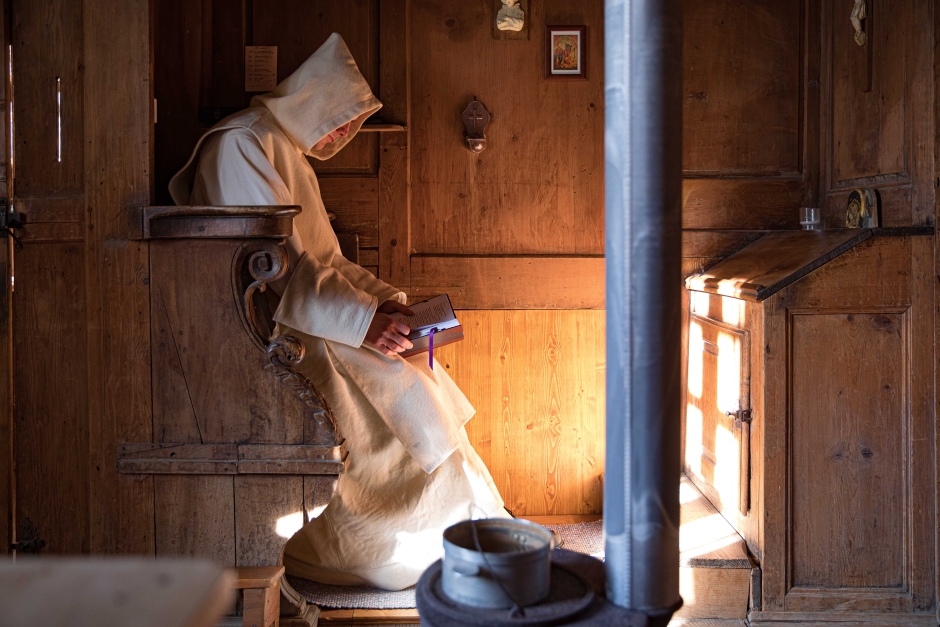

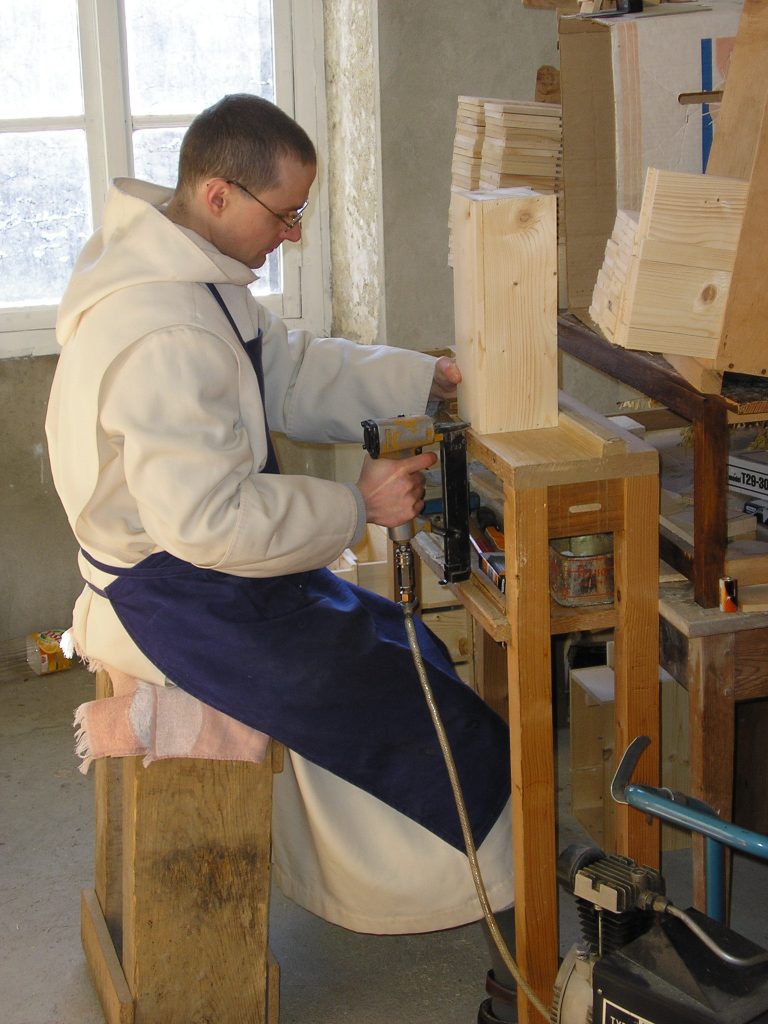


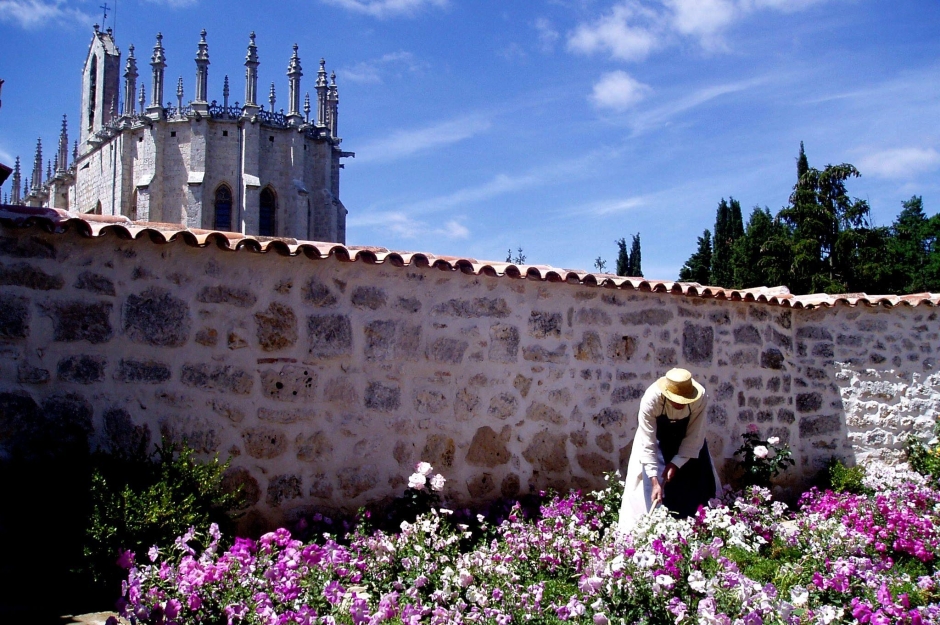
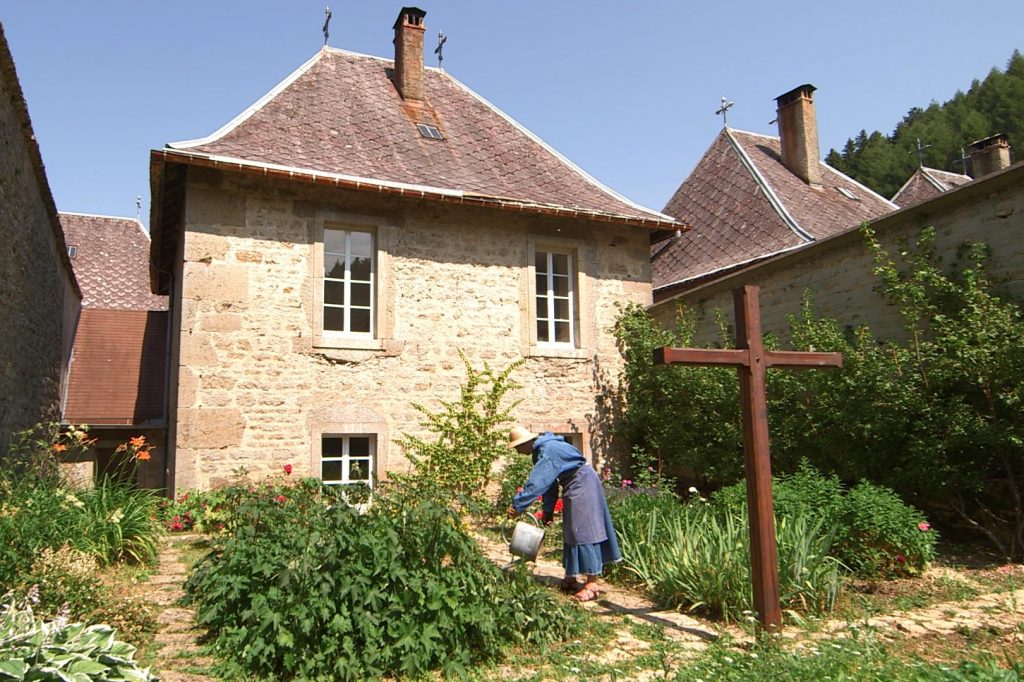
All the monks living in the cloister are priests or destined to be priests. Ecclesiastical studies are carried out in the monastery. In particular, one the duties that occupies an important place in the life of the monks is the celebration of the Liturgy. They are responsible for the liturgical services and therefore they must be able to sing.
The fathers have a weekly walk during which they can converse freely, two by two, and also a weekly recreation, on Sundays. These are important elements for the balance of their lives, tempering the sobriety of the solitary life with fraternal encounters.
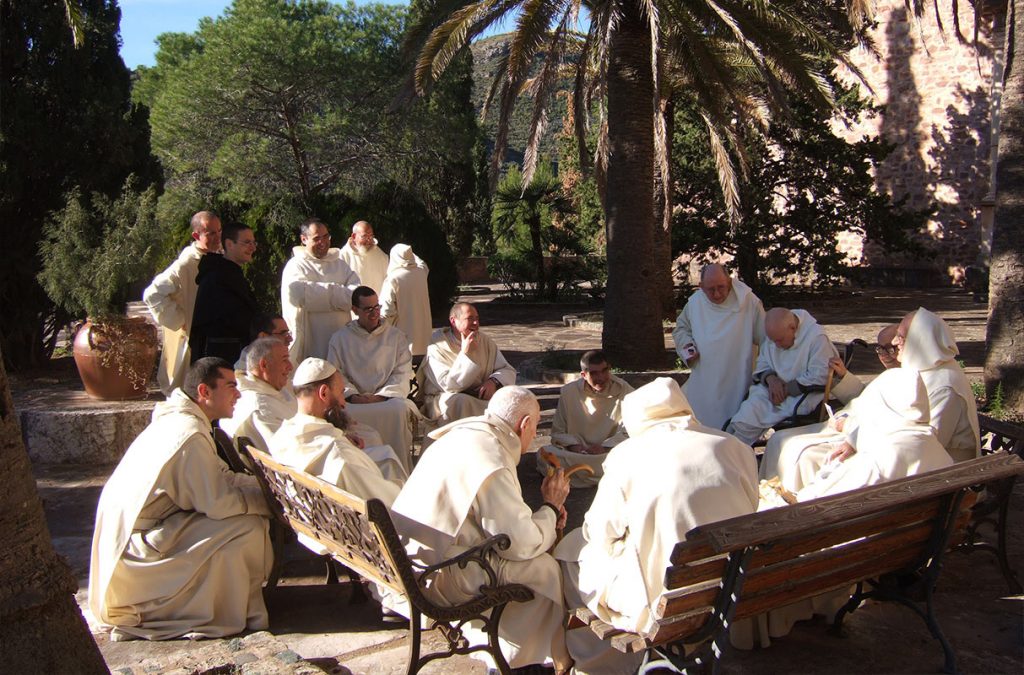

The lay brothers monks:
The brothers also lead an intense life of prayer, but more simplified. They are responsible for the many services necessary for the smooth running of the house: cooking, vegetable garden, tailoring, maintenance, etc. They are not priests, nevertheless they participate in the community liturgy.
They have their own cell, but it is smaller as they carry out the various services, outside of cell, for a great part of the day. Their living environment is the monastery itself. They receive a doctrinal and monastic formation adapted to them.
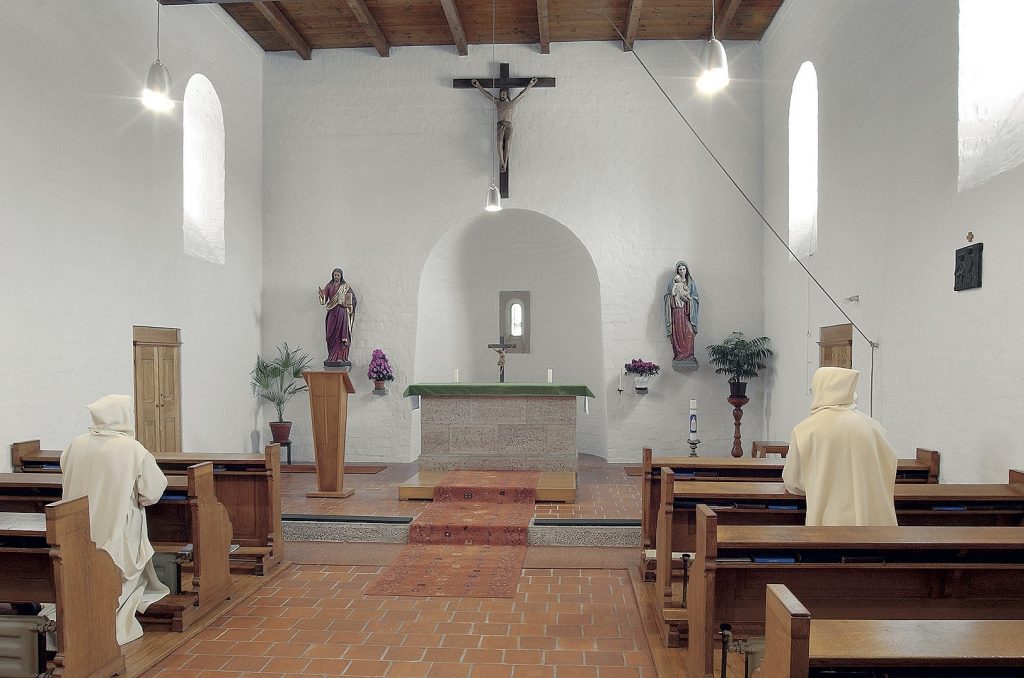
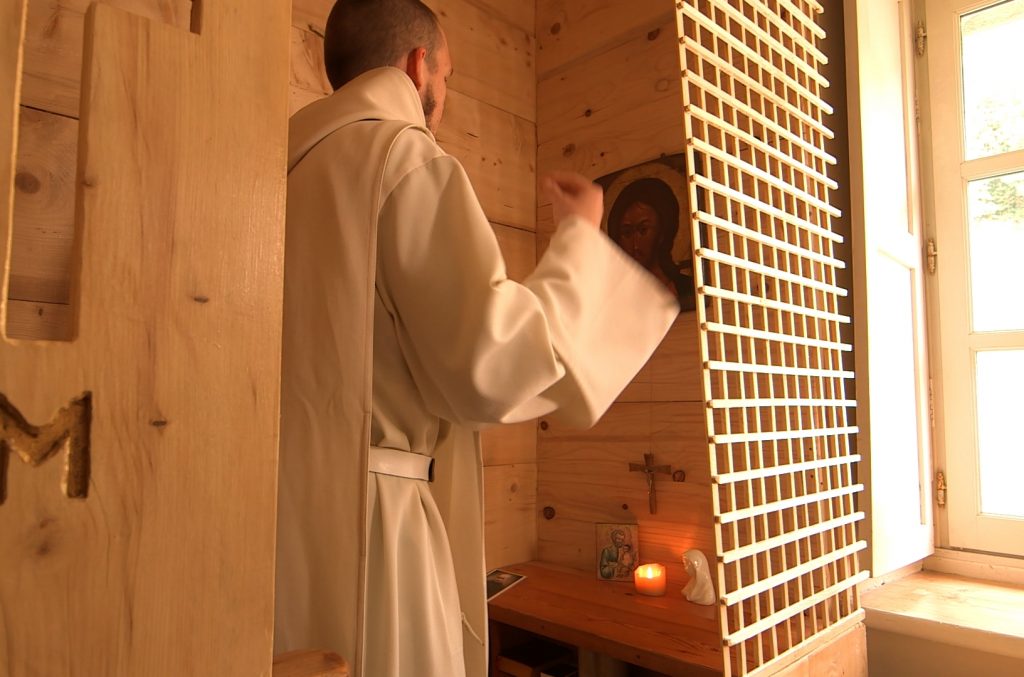
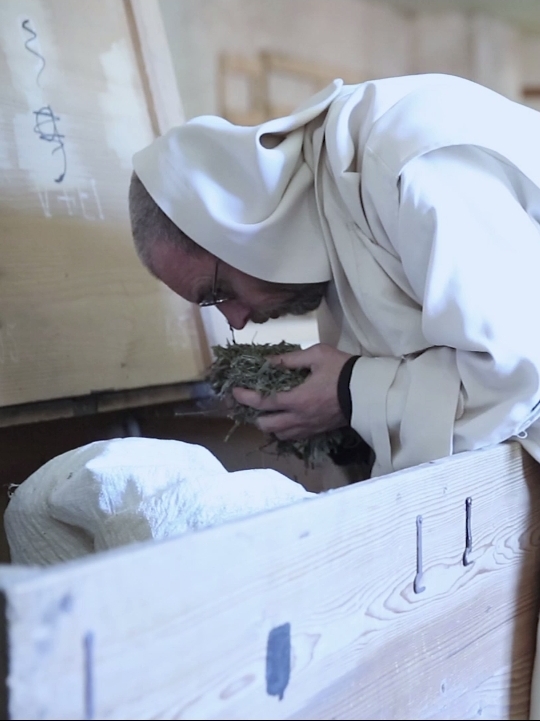
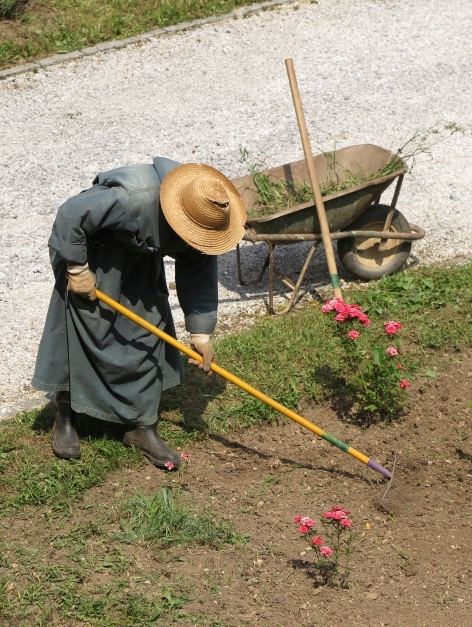
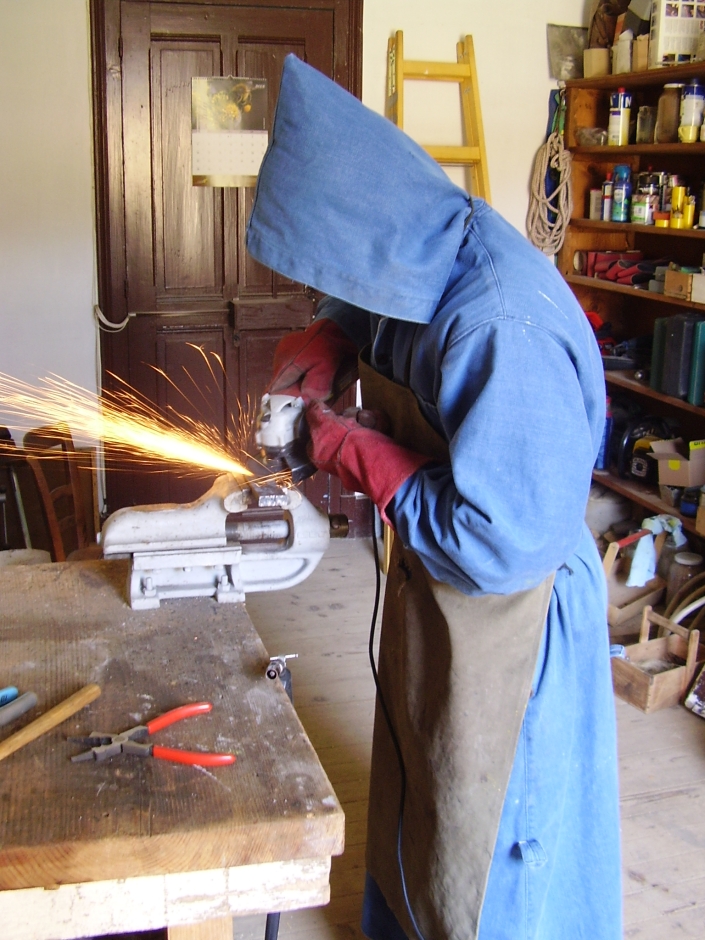

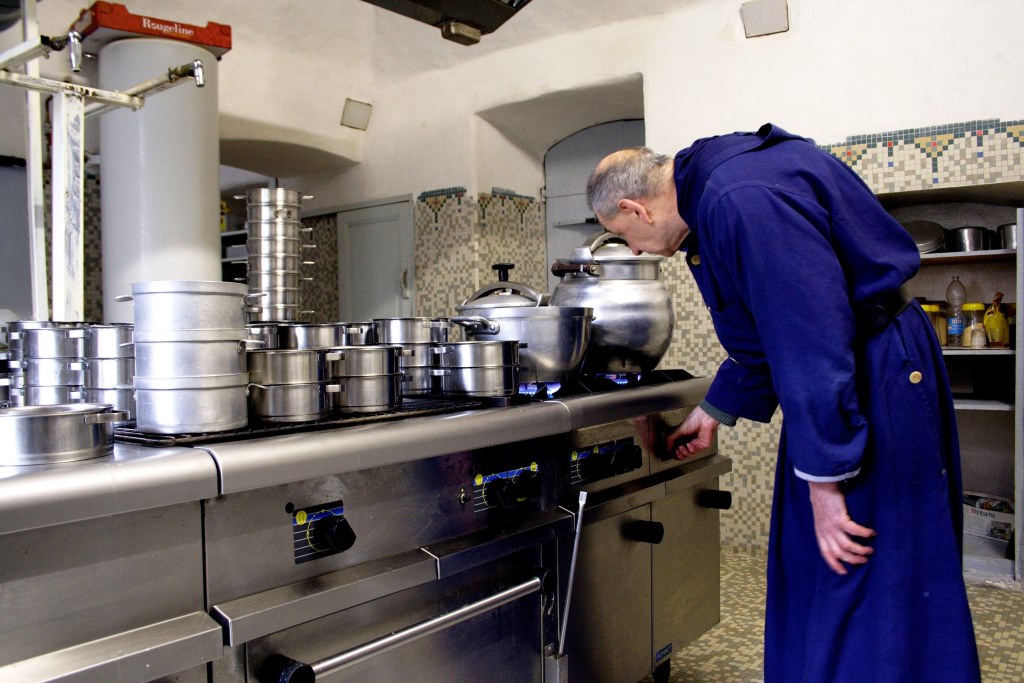
The brothers have walks and recreations, but less often than the fathers as they have less need of them because of their work outside of cell. Several times a year they meet with the fathers to foster the union of the whole community.
There are two possibilities in the brothers’ life: life as converse brother or as donate brother. The converse brothers take the same monastic vows as the fathers, and therefore have the same religious commitments, rights and duties. The donate brothers, on the other hand, do not make vows, but out of love for God give themselves to the service of the Order by a mutual commitment. They have their own customs and are bound to fewer observances, often fulfilling tasks much less easily compatible with the observances of the converse brothers. This life is an option offered to those who, for whatever reason, cannot embrace the life of a converse brother.

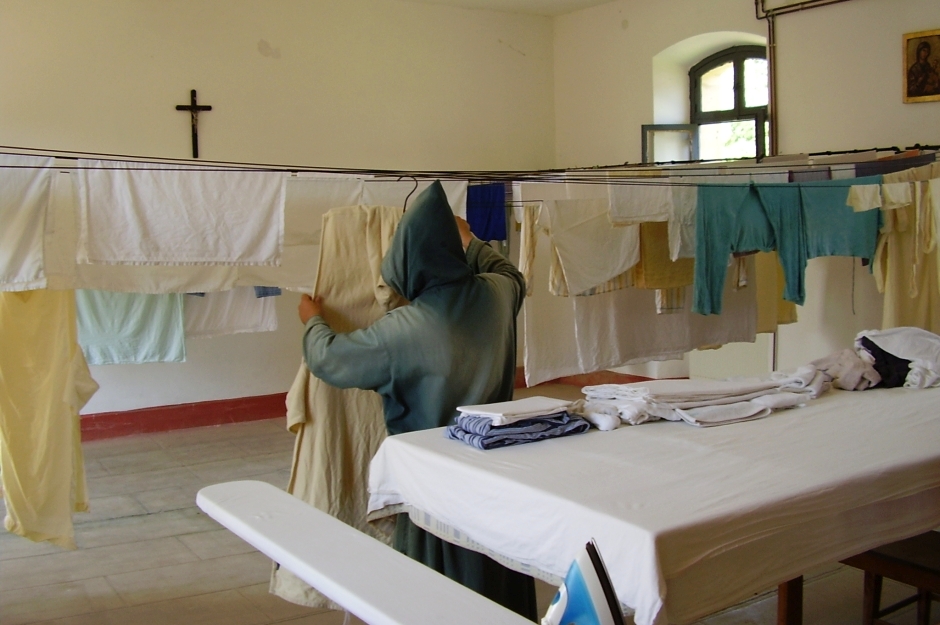

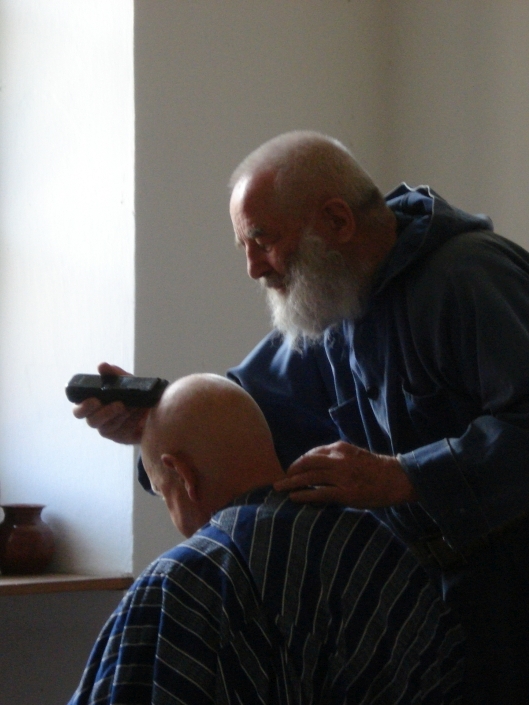


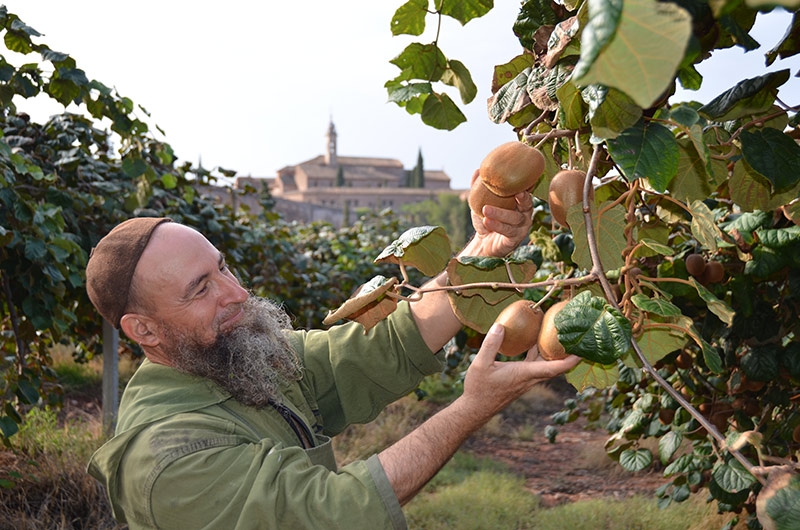
The vocations of fathers and brothers are complementary: they support each other. On the other hand, the vocation of brother has undergone a positive evolution in recent times. In the past, as they were often illiterate, they were sometimes regarded as servants. Today, on the contrary, it is not uncommon to see brothers with a university education. As they did not feel called to the priesthood, they wished to lead a life devoted primarily to prayer, but also with a part of manual work in the service of the community. This has enriched their vocation.
Booklet to download: Short note on the Carthusian brothersII. The discernment of vocation
1. The call
Vocation is a mystery. Every form of religious life responds to a call from God. In the Gospel, to the young man who asked him about a more perfect life, Jesus said: “Go, sell what you possess and give to the poor, and you will have treasure in heaven; and come, follow me” (Mt 19:16-21). Vocation is the form taken by God’s personal call for someone. What matters is to do God’s will; that is our happiness. When the Lord calls, he gives the grace to respond.
The Carthusian vocation is characterised by the balance between two fundamental elements: solitude for God, in a framework of common life. However, our Statutes are explicit: “To become truly a Carthusian monk, good will is not enough; besides love of solitude and of our life, particular aptitudes of mind and body are required, thanks to which a call from God may be recognised… It is not enough to be occupied in his cell and to persevere there respectably until death; something more is required: a spirit of prayer” (Statutes 9.3).
The Carthusian life, which is entirely oriented towards contemplation, obviously requires an eager desire to give oneself to God for himself. Without a living and personal relationship with Christ, it would be impossible. It also requires an attraction to solitude and silence as means to reach this goal. “If life with Christ and intimate union of the soul with God were lacking, faithfulness to ceremonies and regular observance would be of little profit: our life in this case could be justly compared to a body without a soul” (Statutes 9.5). The Carthusian life is balanced and healthy, provided one lets oneself be faithfully guided by its proper demands.
There are two important and complementary aspects to the discernment of a vocation: on the one hand, the supernatural motivation and the feelings of the candidate; on the other hand, whether or not the candidate has the moral, psychological, physical and intellectual aptitudes to lead concretely this way of life. Together, these two pillars will indicate whether or not the candidate has the vocation. However, even if the candidate is convinced that he or she is called to the Carthusian life, the ultimate judgement is reserved for those who know it well, those who are responsible for the institute: first the formator who accompanies the candidate, then the prior who receives him, and the community which will vote at each new stage of the formation.
In order to live in cell suitably, one must have a well-balanced mind, sound judgement, common sense, and a frank and open character. But, at the same time, a certain aptitude for life in common is required: a sociable and docile nature (capable of being guided and formed). To be able to carry the weight of the observance, good general health is also required, as well as a temperament that is not too nervous, and a healthy sleep. For the fathers, a minimum of singing ability is required. In addition, a certain human maturity is required, which allows one to face the demands of solitude in the long term. Therefore, we do not admit candidates before the age of 20. However, one must be young enough to be able to adapt easily to our way of life, and flexible enough to receive a formation. The limit of age for receiving candidates is 45 years. It is highly desirable to have finished his studies or to have shown stability in his profession. It is necessary to be free from the bonds of marriage and to have neither debts or responsibilities to third parties.
2. Initial contacts
This is an important preliminary stage. When, after reflection and prayer, a candidate feels called and seriously considers the possibility of a Carthusian vocation, he enters into contact with a charterhouse of his choice. He must make himself known in all sincerity and transparency by writing a good presentation of himself to the Novice Master. In a simple and cordial exchange with him, the candidate will be able to further clarify his call. Then, if the conditions are favourable, he will be invited to come and make one or more retreats in the monastery. He will then live for one to several weeks in conditions similar to those of the monks and participate in most of the activities of the monastic life: offices, solitude in cell, recreations, etc. He will then be able to form a more accurate idea of the life he wishes to embrace and of his personal dispositions. For their part, those in charge will be able to get to know him better in order to form a well-founded judgement on the vocation that is presented.
3. The stages of formation
If, after a further period of reflection, the candidate asks to enter the monastery to become a Carthusian monk and if he is accepted, he will then begin the course of formation to religious life. The stages of this formation, both monastic and spiritual, are similar, though not identical, for the cloister monks and the brothers. During their stay in the novitiate, postulants, novices and young professed are under the guidance of the Novice Master. He visits them regularly in their cells and gives them a weekly conference.
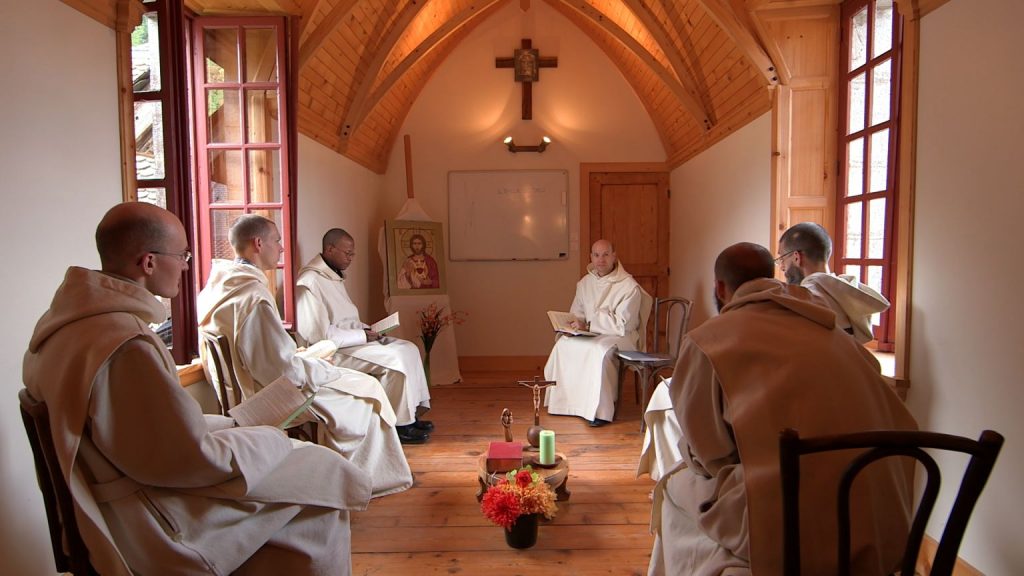
The cloister monks
a. Postulancy: There is an initial period of adaptation. Then the candidate enters the postulancy: he receives a black mantle, which he wears over his civilian clothes, and takes part in all the conventual offices. He is given a place in the monks’ choir in the church and in the refectory. The postulancy lasts between three and twelve months.
b. Novitiate: If the postulant is accepted by the community, he receives the habit of a novice, with a black mantle, and is led to his cell in a significant rite of installation. He is given responsibility for certain small services. A cloister novice begins his ecclesiastical studies from the second year of the novitiate; they will continue for several years.
c. First temporary profession: If the novitiate has been completed in a satisfactory way, after the vote of the community, the novice makes his first religious profession, a true consecration to God, for three years. He commits himself in the Order by the vows of stability, obedience and conversion of life (which includes poverty and chastity). The young professed monk leaves his black mantle, and puts on a long cowl with lateral bands of the same material, which are the distinctive sign of the professed monks. He remains in the novitiate under the guidance of the Novice Master to continue his religious formation. The young professed can receive the ministries of Lector and Acolyte.
d. Second temporary profession: Once the period of his first profession is completed, the young professed renews it for two years. From that moment he leaves the novitiate, ceases to be under the direction of the Novice Master and lives with the solemnly professed. He begins a more solitary life, the one he will lead for the rest of his life.
e. Solemn profession: If the young professed perseveres in his intention, after a vote of the community and with the consent of the Minister General of the Order, he makes his solemn or perpetual profession, which binds him forever to God in an indissoluble bond. A little more than seven years will have passed before he takes this momentous decision by which he commits himself for his entire life.
f. Diaconal and priestly ordinations: Later, having finished his studies and reached sufficient human and spiritual maturity, the monk receives the diaconal and then the priestly ordination, exercising the associated liturgical functions, but without any external apostolate.

The converse brothers
a. Postulancy: There is an initial period of adaptation. Then the candidate enters the Postulancy: he receives a black mantle which he wears over his civilian clothes, and takes part in the conventual offices with the brothers. He is given his place in church and refectory. The candidates who join the brothers start their life of work and prayer from the very beginning. The postulancy lasts between three and twelve months.
b. Novitiate: At the end of the Postulancy, the young brother is proposed to the community for his admission to the novitiate and a vote takes place as at each of the subsequent stages. He receives the Carthusian habit: a robe, a short cowl without bands, and a black mantle for the liturgical offices. The novitiate lasts for two years. Before the second year, the young brother chooses between the life of converse and that of donate. The novice brother begins his doctrinal studies, adapted to his possibilities, from the second year of the novitiate.
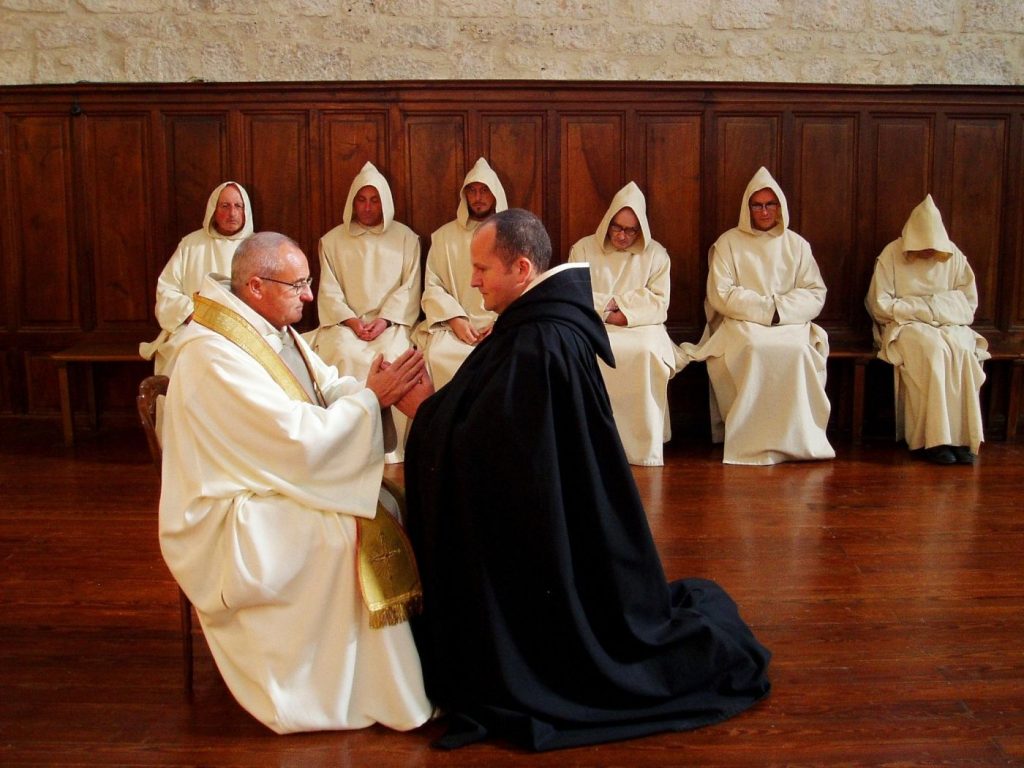
c. First temporary profession: After the novitiate, if he is accepted by the vote of the community, the brother consecrates himself to God by the profession of the vows of obedience, conversion of life (which includes poverty and chastity) and perseverance in the monastery, for a period of three years. He leaves the mantle and receives a cowl with lateral bands, which are the sign of the profession.
d. Second temporary profession: at the end of these three years, he renews his vows for a further two years. He remains in the care of the Novice Master until the end of this period.
e. Solemn Profession: A little more than seven years after his entry, the brother pronounces his final vows, which bind him forever to God in the Carthusian Order.
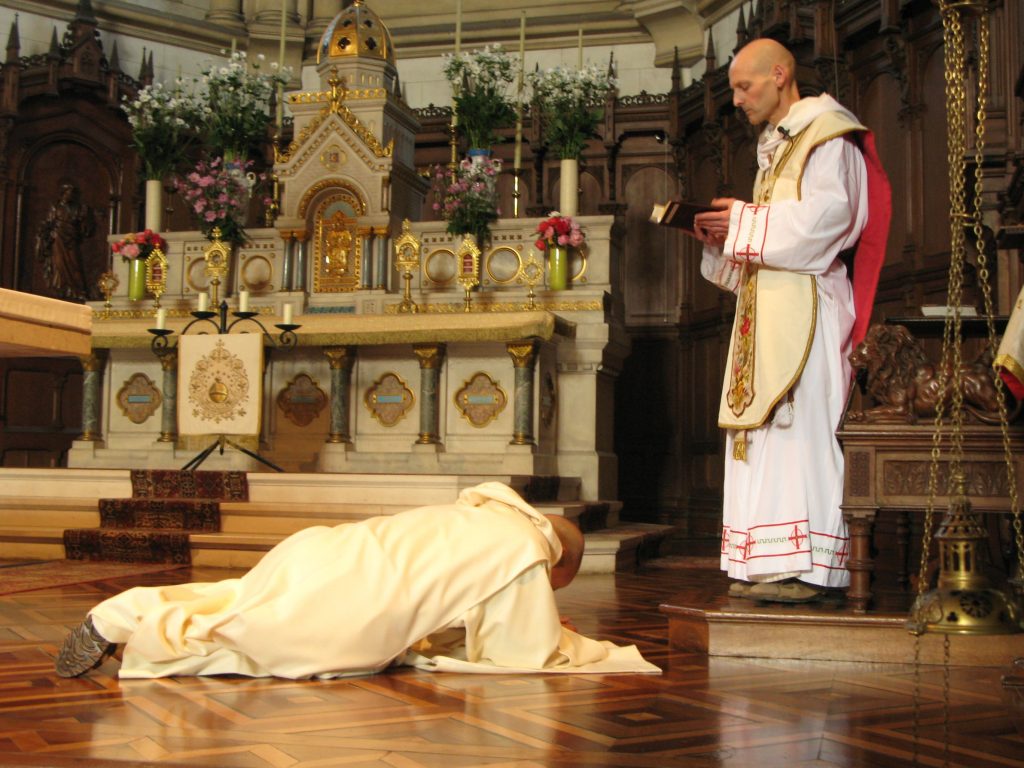
The donate brothers
The novice brother can choose to become a donate brother. This state of life allows for adaptations of the observance according to personal needs. The donate brother does not take religious vows, but only a promise to serve God wholeheartedly in the Carthusian Order according to the Statutes, sealed by a reciprocal commitment. After the novitiate, if he is accepted by the community, the brother makes his donation for three years, leaves the black mantle and receives a long cowl without bands. At the end of this period, he renews his donation for another two years. Then, at the end of the time of probation and formation, he can choose between a perpetual donation, which commits him to the Order forever, and a triennial donation, which means that in the future he will renew his donation every three years.



































